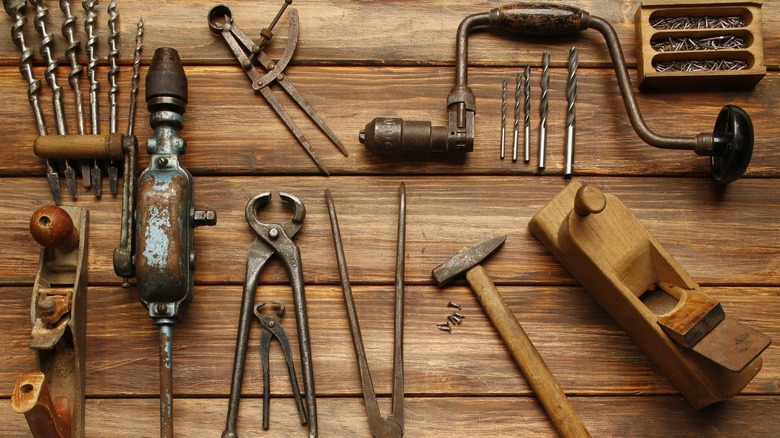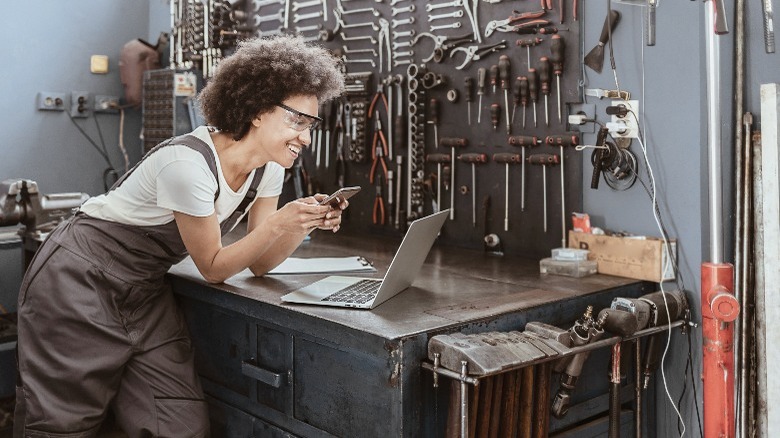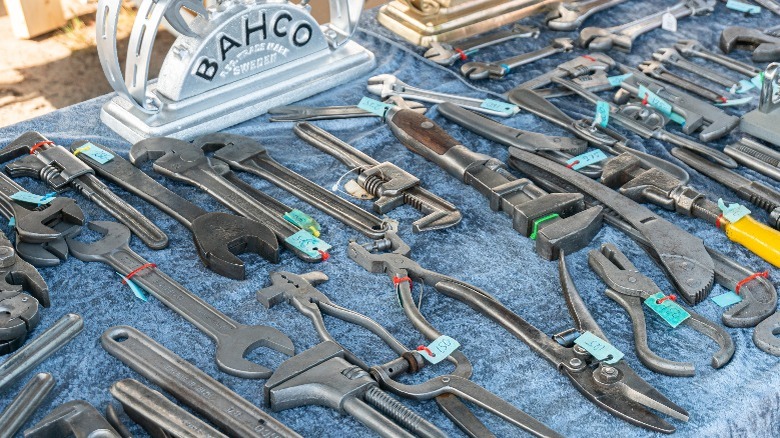The Risk With Buying Used Tools
For tradespeople and tool enthusiasts, there's nothing like expanding your collection with some shiny new toys. The problem is that tools, especially high-quality, professional items, can be extremely expensive. And for casual DIYers and people just starting a career in the trades, building a kit can be challenging and burdensome. Fortunately, there are a few ways to fill up your toolbox without breaking the bank. Stores like Harbor Freight are known for offering a wide range of budget-friendly tools, and shopping at economy stores is a great way to get your hands on products that traditionally come with costly price tags.
Buying used tools is another one of the best ways to build a professional tool kit on a budget. It's not uncommon to find name-brand items at your local pawn shops and estate sales, and there are plenty of sites online packed to the brim with used tool deals. However, buying used tools online comes with its share of risks. It's not usually possible to inspect tools yourself when shopping online. And no matter how many photos the seller uploads, there could always be a hidden defect lurking under the surface. That said, buying used tools online can still be an excellent way to flesh out your kit and snag some phenomenal deals — you'll just need to take a few precautions to protect your wallet. What kinds of risks do you need to look out for, and what steps can you take to protect yourself when shopping for used tools online? Let's dive in and find out.
You can't inspect the tools yourself
One of the biggest issues with buying used tools online is the fact that you typically can't inspect them before making a purchase. There are some exceptions, of course. For example, if you find a used tool for sale locally on Facebook Marketplace or Craigslist, you may be able to meet up with the seller to inspect the items before money changes hands. However, in most cases, buying used tools online requires you to trust the seller to be honest about the condition of the devices you plan to buy.
That's a pretty big deal. It's important that your tools function properly, especially if you're a tradesperson. Professionals need their tools to work correctly every day, 365 days a year. They also require high-quality devices that won't break or damage the machinery they work on. While buying used tools online can be a great way to find bargains, it's also an easy way to get scammed or end up with a dud item. Some ways to avoid those problems include buying from reputable sellers with detailed and transparent shipping/return information, and requesting additional photos or videos of the tools before sending the payment. Additionally, you should have a solid understanding of the tools you plan to buy, meaning that you should know what to look for in a used item and how to identify obvious defects or fakes when buying expensive name-brand devices.
There's no guarantee that the seller will send you the correct item
Another risk you take when buying used tools online is that the seller may not actually send you the item you pay for. For example, maybe you found a sweet deal on a used Snap-on ratchet. You send the seller the money, and they send you the order confirmation. All good so far, right? Well, that good experience can quickly turn into a nightmare if you open your package to discover a basic Craftsman or other budget-brand item.
There's really no way to ensure that the seller will be honest or send you the correct tool when buying used items online. But although that risk will always exist, there are some steps you can take to minimize your chances of falling victim to a scam. As we mentioned above, you should stick to reputable sellers who have many positive reviews from past customers. You should also confirm that returns are accepted if you're unsatisfied with the tool you receive. While it's impossible to eliminate the risk of being scammed completely when shopping online, following those basic steps can help maximize your safety and help you get the tools you need with minimal hassle.
They may not come with a warranty
Another major issue with buying used tools online is that you may not be able to get a warranty for the devices that you purchase. There is a bit of nuance here, though, because that statement can depend on the brand of tools you buy. For example, many professional-tier brands, like Snap-on and Matco, offer lifetime warranties on most of their tools. If you buy a used tool from one of these brands, the company will honor its warranty in most cases, even if you didn't buy the tool new. However, not all tool manufacturers provide lifetime warranties. If you buy a used tool from a brand without a lifetime guarantee, and it breaks after a short period, you may not be able to get a replacement.
But even if the used tool you buy isn't covered by a manufacturer's warranty, you may still have some options. Some sellers offer their own warranties. These warranties typically last for shorter periods than the guarantees provided by manufacturers, but they're still better than nothing. You should also remember the steps outlined above — purchasing from a reputable seller and understanding the tools you buy can go a long way toward avoiding defective devices and the need for a warranty altogether.
Safe places to buy used tools online
So, given the risks associated with buying used tools online, are there any safe places to shop? The answer is yes, but that doesn't mean you should disregard the risks covered here. It's vital that you exercise caution when shopping online, but it's especially important when shopping for used items. That's because used products are typically sold by private sellers, not actual businesses concerned about their reputation or poor reviews. That opens the door for fraud and scams, and it's important that you look for trusted sellers whenever possible.
One of the best and safest places to shop for used tools online is eBay. That's because you can search specifically for sellers with exceptional ratings and read reviews and testimony from prior customers. Furthermore, many eBay sellers provide warranties on their products or offer generous return windows in case your item arrives broken or defective. eBay sellers are motivated to provide quality service because, if they don't, their ratings will drop, and they'll lose business.
Outside of eBay, you can check various classified sites when shopping for used tools. Places like Facebook Marketplace, Craigslist, and OfferUp can be excellent sources for tool bargains. However, these sites aren't typically populated with dedicated sellers. Instead, classified sites are usually used by regular people who need to sell or buy something. While they can be solid places to find good deals on used tools, you'll need to be extremely careful trusting random people. Try to meet up in person to inspect the item whenever possible, and remember to ask for additional photos and videos of the tool in action. Those simple steps can help keep your wallet safe and help ensure that you get the tools you need without any issues.
Safe places to buy used tools offline
If you're open to buying your used tools in person, you have a lot more options. It can also be safer than buying them from random people online. Some of the best places to look for used tools include pawn shops, estate/garage sales, and second-hand stores. When you visit these places, you'll have the opportunity to inspect the tools yourself. You can try them out to confirm they work as intended, and you can be sure that you get the item you actually want, as opposed to a fake or lower-quality version. The best part about shopping at some of those places is that the workers may not understand how valuable some tools are. That means you may be able to find extremely low prices on high-quality, professional-tier items.
All of that said, it's still wise to exercise caution. Even when shopping at a legitimate store, it's important to understand the tools you're buying so that you can inspect them properly. Ask about any warranties or return policies, and make sure that you check to make sure the advertised prices actually represent significant savings — otherwise, you may be better off buying new.





